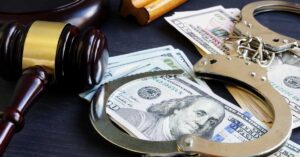Are People Charged with Drug Crimes Eligible for Bail?
Possession of a controlled substance, drug trafficking, and other drug charges can come with steep penalties if convicted. However, does the charge affect drug crime bail eligibility in Florida? And what bail amount can you expect if you’re arrested on drug possession or trafficking charges? Learn more about drug crimes and potential penalties, and contact a lawyer with experience in drug crimes to defend you.
What Is the Comprehensive Drug Abuse Prevention and Control Act?
In 1970, the U.S. legislature passed the Comprehensive Drug Abuse Prevention and Control Act (CDAPCA), and President Richard Nixon signed it into law on October 27 that same year. The law defined standards for the prescription drug industry and described a schedule of controlled substances in five different classes.
Chapter 893 of the Florida Statutes describes the State of Florida’s specific conditions and additions in conjunction with CDAPCA.
Types of Drug Possession Charges in Florida
Drug possession in Florida is often a felony, but you still may be eligible for bail. The court can decide to grant bail, typically starting at $10,000. Several factors can influence the bail amount, including:
- Types of substances involved in the charges
- If you have a criminal history (arrests or convictions)
- Quantity of drugs in possession
- Type of possession
Florida recognizes three different types of possession: constructive possession, actual possession, and joint possession. Constructive possession describes stored substances under your control, such as if you held drugs in your home, vehicle, office, or other location.
Actual possession describes when you have the substance on your person at the time of the arrest. Joint possession is when you and other parties present had the same substance on your persons at the time of the arrest.
Penalties for Possession of a Controlled Substance and Bail Eligibility
Drug crimes in Florida range from a first-degree misdemeanor to a first-degree felony depending on the class of drug and quantity held. More serious charges might affect your drug crime bail eligibility. Penalties for each degree of possession charge include:
- First-degree misdemeanor. Up to $1,000 in fines and one year in jail. A misdemeanor would include possession of less than 20 grams of marijuana or marijuana derivatives or less than three grams of a synthetic drug like bath salts, K2, spices, or other synthetics.
- Third-degree felony. Up to $5,000 in fines and five years in prison, generally for possession of certain Schedule IV and Schedule V drugs, including over 20 grams of marijuana, three grams of synthetics, or 28 grams of cocaine. This can also include unlawfully possessing certain amounts of prescription drugs without a prescription.
- Second-degree felony. Up to $10,000 in fines and 15 years in prison for drug trafficking. Possessing more than four grams of fentanyl or heroin qualifies for drug trafficking as a second-degree felony.
- First-degree felony. Up to $10,000 in fines and 30 years in prison. In most cases, you must have multiple prior convictions of lesser drug crimes, or the prosecution must have evidence of larger distribution under your control, to pursue a first-degree felony charge.
If arrested on drug charges, you may be able to post bail and avoid jail time while you await your trial. As soon as possible, find an experienced drug defense attorney to represent you in your case.
Contact an Experienced Drug Possession Attorney in South Florida
To learn more about drug crime bail eligibility in South Florida, contact Michael White, P.A. We proudly serve Broward, Miami-Dade, Palm Beach, Martin, St. Lucie, and Indian River Counties. Call us today at 954-350-0595 or contact us online to schedule a consultation for a drug crime arrest.



